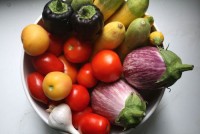Best practices for produce storage
 Are you a little unsure as to how you should store produce?
Are you a little unsure as to how you should store produce?
When you consider all the variables, such as the fact that some produce benefits from sunlight and others are negatively impacted by it, it can be a little confusing trying to figure out the best storage approach for each item.
Food and sunlight
Different foods react differently to sunlight, with the rays benefitting some foods and having a negative effect on others. For example, when certain foods are in their growing phase – such as fruits like apples and oranges – the sunlight proves a positive influence. But, once most fruits have ripened, excessive exposure to the sun speeds up their rate of deterioration, just like it speeds up their ripening phase.
The majority of perishable goods, like biscuits, should be stored away from sunlight where possible. And, as you most likely know, dairy products and the sun will rarely ever work well together, so keep them stored away from the sun in cool environments.
Fruits / vegetables
For the most part, fruits and vegetables will deteriorate at far quicker rates if they’re kept inside bags – particularly plastic bags. If at all possible, the best approach is to allow the majority of your fruits and veggies to breathe.
As not every fruit or vegetable is the same, some will benefit from different storage methods. Lettuce can survive quite some time inside a plastic bag provided you keep it refrigerated. When it comes time to use the lettuce, don’t forget to run whichever parts you’re using under a cool stream of water first.
There’s a good number of fruits and vegetables that will maintain crispness and life if kept in the cool, controlled environment of a fridge. This includes the likes of watermelon and rock melon. But regardless of whether your fruits thrive in or out of the fridge, one thing to avoid is excessive humidity. It’s an assured killer of almost all fruits and vegetables.
Dairy products and meat
Out of all the foods out there, both dairy products and meats are some of the most temperamental. Improper storage can lead to rapid deterioration and the development of extremely harmful bacteria.
If you intend to use meats not too long after you purchase them, then most of them will be fine stored in the fridge. However, if you believe it’s going to go past a couple of days before you use a meat product, then you should most definitely freeze it. When you go to defrost meats, however, just be aware that the best approach is allow them defrost in your fridge for 24 hours. Defrosting at room temperature can allow bacteria to form rapidly, which can present serious health concerns.
For dairy products, the best option is to refrigerate them. You can freeze certain dairy products if necessary, but almost all will benefit more from only being refrigerated and consumed within days of purchase.
The difference between “Best Before” and “Use By”
Another quick point to note is what the difference between product “Best Before” and “Use By” dates is.
Best Before denotes the date you should consume your product by to have it at its best quality. Once the Best Before date is reached, the food/drink may still be consumable, but it may be of lesser quality (e.g. stale or slightly off-taste).
On the other hand, Use By denotes the date that you must consume a product by. After that date, the food/drink is unfit for consumption and could cause illness or poisoning if consumed after the date.